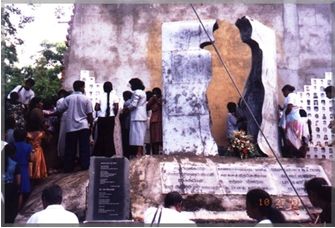SRI LANKA: The day of commemoration for the disappeared – may God save us from madness


On 27 October, about 400 persons from the north and south, most of whom are family members of disappeared persons, gathered at the Monument for the Disappeared at Raddaluwa, Seeduwa. Like the gatherings in previous years, this year’s too was a very sad spectacle to watch. Several of the persons carried flowers or a candle to place before their loved ones, whose photographs are set in the marble of the monument.
There are many disappeared family members whose photographs have not yet been displayed, though all the participants find affinity in each other’s acts of respect for their lost loved ones.
This is not, however, just a commemoration of the dead. What binds these people together is the wounds they carry, not only of their losses but also of the hurt that comes from those acts of cruelty being committed by agents of the state. Perhaps the most wounded people among all Sri Lankans are the family members of the disappeared. Their suffering is so complex because they have been denied any kind of explanation of what might have happened to their lost family members. The most elementary courtesies that the state extends even in the most difficult circumstances are not extended to them.
The public message from the state is that it will not in any way respond to these persons. Some regret may be expressed privately but, for all official purposes, the policy is one of complete denial. Not only were the disappearances conducted in a secret manner but the state wants all information about them to remain a secret forever.
The family members cannot erase their memories. However, the state wants them to live as if they have lost their memory about their disappeared loved ones. To have a vivid memory and to live as if one does not have memories is impossible unless one goes mad.
It is not only the families of the disappeared who are supposed to lose the memory of their loss; the entire nation is being asked to do so by the state. The state justifies it under a policy which says that to deal with issues such as enforced disappearances will ‘reopen old wounds’. This is now proclaimed almost as dogma and considered a condition of being loyal to the state. The loyalty demands that Sri Lankans as a whole should lose their memory of the disappearances. Again, in the case of individuals (as well as collectively) it is impossible to abandon one’s memory except when one loses one’s mind altogether. The state policy of not opening the ‘old wounds’ presupposes that the people, even if they are not insane, should at least behave as if they were.
‘Reopening old wounds’ is itself a senseless phrase. The memories of the families of disappeared persons, like for anyone else who suffers from a serious grievance, do not grow old. The mere passing of days or even years does not make an internal wound old. In any case, if a wound does not heal it means that it is festering. An old wound, therefore, is worse than a fresh one. You can close an old wound only at your own peril. Therefore, the policy expressed in the words of closing an old wound is itself an absurdity.
All human relationships need to be bound through moral, ethical and legal connections. If order and sanity are to prevail within a community, the state in its relationship with the people has to formulate its policies in terms of these moral, ethical and legal bonds. This simple principle applies also, and even more so, in the case of an acute human problem such as the causing of disappearances. If the state itself wishes to ignore these moral, ethical and legal obligations towards it own people, who accuse it of having wronged them, there are then very fundamental moral, ethical and legal problems.
Solzhenitsyn, one of the great writers who reflected on such problems in his own society (Russia under Joseph Stalin), wrote a profound poem entitled God prevent me from going mad. In this poem he reflects on the long prison sentence he was suffering through no fault of his own but due to the fault of the political system he was living under. The only way by which he could remain sane was by memorizing the experiences that he had been exposed to. He began to fear the loss of his memory and the only thing that kept him sane was memory. The title of the poem, God prevent me from going mad, reflects this profound problem.
The Sri Lankans who have memories of the disappeared persons (and also the whole nation, which is aware of the problem of disappearances) keep their loyalties to their moral, ethical and legal codes only by retaining this memory until such time as when, by way of a proper response, the state, which caused the problem, takes steps towards reconciliation. Merely appointing commissions that are unable to convince the people of any credible intentions of the state only add insult to injury. As long as the state itself becomes the opponent to such reconciliation, the people are exposed to a similar experience as that expressed by Solzhenitsyn.
To support this case, please click here: SEND APPEAL LETTER



